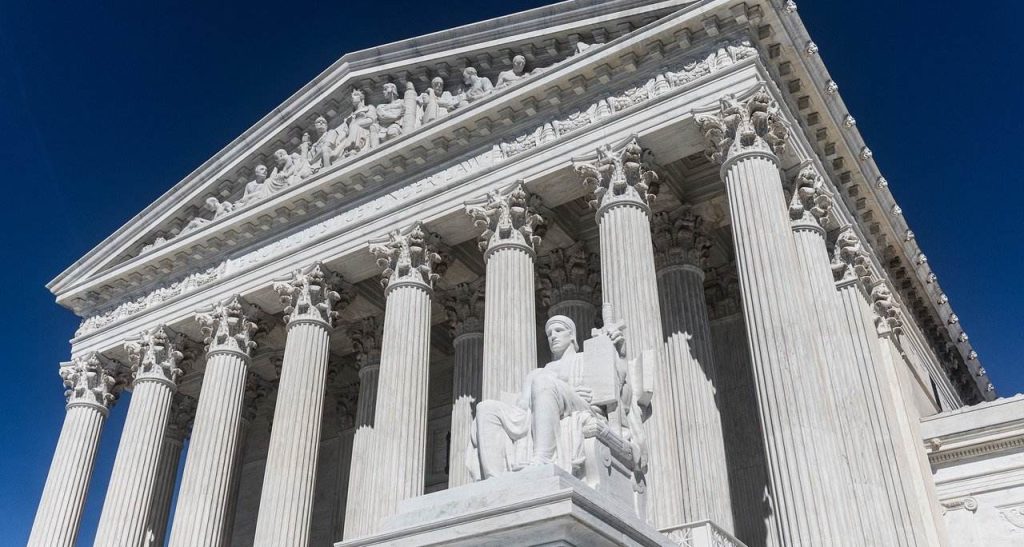The National Constitutional Law Union (“NCLU”) Filed An Amicus Brief With The Supreme Court Urging For Absolute Presidential Immunity As Demanded By Alexander Hamilton In The Federalist Papers
The National Constitutional Law Union (“NCLU”), founded by John Pierce, recently filed an amicus curiae – or “friend of the court” brief – on behalf of Petitioner, Donald Trump, for the President’s immunity case before the Supreme Court.
NCLU’s lawyers argued in favor of absolute presidential immunity, supported by a broad construction of unitary executive theory that qualifies the Vesting Clause of Article II, which confers executive power, categorically, in the President of the United States.
It does not grant absolute executive power in a cabinet secretary, Vice President, Attorney General, any member of the Joint Chiefs of Staff – and certainly not in an unelected member of the administrative or “deep” state, comprising the sprawling federal bureaucracy, which is accountable to no democratically elected officeholder. The clause only confers absolute executive power in a President of the United States.
Support for President Trump’s argument – as explained in the NCLU brief – is extensively observed throughout Alexander Hamilton’s (one of the most influential of the Founding Fathers, particularly in the campaign to get the Constitution ratified, as well as President George Washington’s right-hand man) writings in The Federalist Papers, including Federalist 65, 69, 70, and 77 (among many other articles).
The Federalist Papers is a foundational document, written in 1788 to educate a New York audience about the Constitution, that judges and lawyers still readily make reference to today.
Popularized by late Justice Antonin Scalia, reference to The Federalist Papers has become increasingly popular in recent decades. Judges and lawyers incorporate the wisdom from this document into their decisions and oral arguments as an authoritative, founding-era guide for interpreting the Constitution based on its original meaning.
In addition to The Federalist Papers, NCLU brief also details that support for absolute immunity is found repeatedly in some of the most important Supreme Court decisions dealing with issues of presidential power across most of American history – from arguably the most seminal case, Marbury v. Madison (1803), wherein the Court decrees that certain presidential acts “can never be examinable by the Courts,” through Nixon v. Fitzgerald (1982), which held that many presidential acts – including those classified within the “outer perimeter” of official duties – are, by their nature, immune from government prosecution.
Last, history, tradition, and common sense would both overwhelmingly support President Trump’s position. Evidence of the former is found in the fact that no President, ever, was prosecuted for carrying out the duties of his office – Andrew Johnson, Richard Nixon, and Bill Clinton, included – even if such duties were not technically considered “official” under the law.
In President Trump’s case, unlike the cases of Richard Nixon or Bill Clinton, for instance, the determination of whether President Trump’s inquiries into the fraudulent election procedures out of Georgia (and other places) is much more straightforward: the President has a duty to enforce the laws – including election law – under the Constitution, plain and simple.
Constitutional support for this view is found, among various other places, in the Take Care Clause, Article II, Sec. 3, which provides that the President “shall take Care that the Laws be faithfully executed . . . .”
Election laws, obviously, fall under the category of “Laws” requiring enforcement pursuant to the Constitutional article. As such, President Trump had a duty to see to it that the election processes were not fraudulent or vulnerable to fraud by nefarious actors, foreign and domestic.
Thus, what President Trump did in the aftermath of the 2020 presidential election was not only “legal,” or a question of presidential power to be decided by the courts – but, in fact, a Constitutional ultimatum.
Insofar as the President of the United States roughly analogizes to “CEO” of the United States, he has a constitutional duty – equivalent to various fiduciary duties for corporate directors – to take actions to ensure, as a threshold matter, that the laws are being fairly applied.
Neglecting his responsibility to oversee the election processes – and inquire into legitimate cases of fraud, where evidence of irregularities, needless to say, was overwhelming in places like Fulton County and Maricopa County – would be tantamount to corporate negligence, a breach of one’s fiduciary duties of care, loyalty, and good faith, to the company.
By a similar vein, in not involving himself in Georgia’s election fraud, President Trump would have breached his fundamental duties to both the Constitution and the public; prudence dictated that he acted.
His fulfillment of that duty – which dramatically heightened public awareness to systemic election fraud issues that have been plaguing our national election processes in not just 2020, but for decades – should be reason to celebrate, not condemn, his patriotic actions.
Relatedly, common sense would demand that if the law is what Nixon v. Fitzgerald says – namely, that all official presidential acts are immune (a view shared by not just Alexander Hamilton, but virtually every Founding Father – and the legal authorities, such as John Marshall and Joseph Story, in whom they sought guidance) – then President Trump’s acts in the aftermath of the 2020 race, having performed them in an official capacity for reasons aforementioned, are shielded for any wrongdoing.
History decisively supports this position: after all, no President had ever before been prosecuted by his successor – until Biden saw it necessary to weaponize the entire justice system against President Trump to keep him out of power for good, something that has obtained heightened urgency with President Trump, who now not just leads, but trounces, the current occupier of the Oval Office, based on every leading poll.
Furthermore, basic reason dictates that regardless of whether President Trump’s acts were official, the fact that an impeachment proceeding took place after he officially left office gives even more support to the view that he has been completely and totally exonerated under the law.
Under the Impeachment Clause, which the NCLU brief scrupulously outlines, the prosecutorial function for presidential misconduct is contained in the act of impeachment (and acquittal) by the Congress itself.
This is the only remedy available for misconduct under the Constitution. That is not to say that it is the only remedy available for redress – but it does indicate that if that remedy is exhausted, a President cannot be subsequently prosecuted for the same alleged misconduct if he has already received congressional acquittal.
Otherwise, if the President is prosecuted again – subsequent to a congressional acquittal – that would be an obvious case of double jeopardy, which the Constitution expressly prohibits under the Fifth Amendment.
The fact that President Trump was impeached (and acquitted) — after he left office, no less, actually gives more support to the view that any attempt at prosecuting him, again, constitutes double jeopardy, violating the Fifth Amendment.
This is because prosecutorial operations are available for live cases and controversies only. The prevailing question – whether President Trump’s acts should be granted immunity because there may be some debate as to whether they fell within or outside the “outer perimeter” of acts qualifying for immunity under Nixon – is rendered moot by the fact that he was impeached – and acquitted – after he left office.
This is because, again, Nixon applies only to official acts; official acts can only be prosecuted, by resort to constitutionally prescribed impeachment mechanisms, while a President is still in office – otherwise, the live case or controversy becomes moot.
Because President Trump had left office, there no longer was any live case or controversy to be prosecuted by virtue of the Impeachment Clause.
But he was prosecuted anyway using the only constitutional remedy available for redressing misconduct: impeachment. Importantly, President Trump was also acquitted, as expressly acknowledged by the D.C. Court of Appeals, which ruled against presidential immunity.
Therefore, to the extent a live case or controversy still existed post-presidency, it must have implicated a question that tested the boundaries of the “outer perimeter” test from Fitzgerald – otherwise, there would be no point in going through the impeachment process in the first place, because the controversy would have already been rendered moot by happenstance of the expiration of President Trump’s first term in office.
Nevertheless, the acquittal from a post-presidential impeachment proves that President Trump’s acts, to the extent they may not have been official, were, at the very least, not criminal – because Congress acquitted him for any and all misconduct.
Thus, the Special Counsel’s attempt to prosecute him, again, for the same alleged misconduct amounts to as obvious a case of double jeopardy there is.
It also should not be forgotten that the political prosecution against President Trump comes amid an extraordinarily heated presidential race that is shaping out to be a rematch of 2020 with President Trump against Joe Biden.
Accordingly, given the current political stakes, there is particular incentive for Joe Biden to prosecute the man who he will face come November’s election – especially with most polls indicating that President Trump is the frontrunner.
The Founding Fathers anticipated this: The Federalist Papers, as noted in the NCLU brief, are replete with warnings about prosecutions of political opponents, particularly of presidential candidates, the highest office of the land, where public scrutiny and hence, vulnerability to a weaponized system of justice, inflamed by the passions of the people, becomes a real and present danger.
Foreseeing this very danger, Alexander Hamilton warned in Federalist 65 and elsewhere of the inherently “political” nature of the presidential office – one that became ripe for spurious accusations arising from “the pre-existing factions (or parties and ideologies)” within the country at large.
Because of the tremendous danger of the impeachment mechanism being abused, as we readily observed throughout the Trump administration – with not one, but two, bogus impeachments against President Trump (with evidence of their bogusness found in the fact that both impeachments were acquitted by a divided Congress) – Hamilton warned that such a power should be “difficult to be obtained in a government wholly elective.”
Otherwise, the form of redress it provides gets cheapened – doing a disservice to the Founding Fathers’ genius, and by extension, to society overall.
As a result of the Left pushing forward with this witch-hunt against President Trump, the Constitution is now on the chopping block. The justice system has been so gratuitously abused by bad faith actors – from Jack Smith to Letitia James to Fani Willis to Merrick Garland – that the rule of law has been almost completely gutted, with corrupt actors threatening permanent damage against America’s time-honored justice system – defined by such staples as due process and the presumption of innocence – and unraveling well over two hundred years of Anglo-American jurisprudence, including the Founding Fathers’ sacred handiwork.
Which is the reason for this particular decision’s outsized importance – no less than the rule of law, and the preservation of freedom, are salient questions before the Supreme Court with President Trump’s immunity decision.
The case goes far beyond the legality of President Trump’s acts while in office, and more deeply implicates fundamental questions about American freedom, and the possibility that the Founding Fathers’ achievement might be passed down another generation.
If the High Court fails in its prerogative and does not confer immunity upon President Trump for his acts, abandoning the longstanding, nearly two century precedent spanning from Marbury to Nixon, it will have betrayed President Trump, the American experiment, and indeed, the cause of human freedom.
For America stands today as the Western world’s “last, best, hope” for freedom and democracy, bar none. But with the cornerstone of that freedom – our Constitution – on the chopping block, a bad ruling severely risks forever casting the world into darkness.
Hamilton said it best: without a functional executive – that is to say, without a President who operates knowing that he will enjoy the immunity both the law and custom demand – good government becomes impossible.
And bad government is defined by tyranny and chaos, the natural byproducts of a government that loses sight of the original ingredients which made it free in the first place. Let us pray that we do not reach that point.
The post The Political Prosecution Waged Against President Trump Shows The Great Need For Absolute Presidential Immunity More Than Ever appeared first on The Gateway Pundit.







